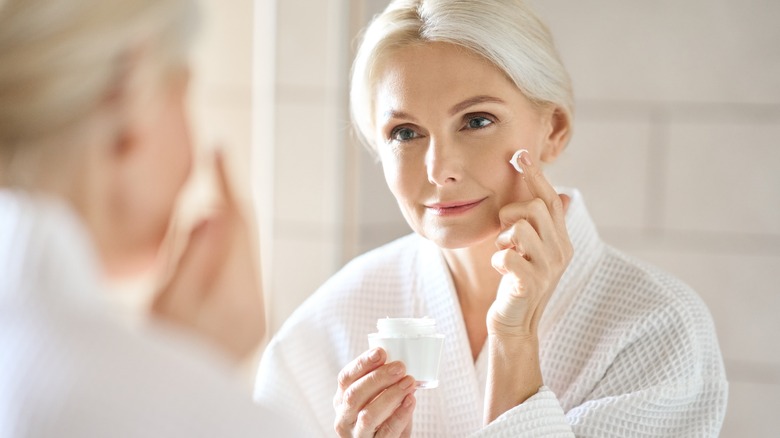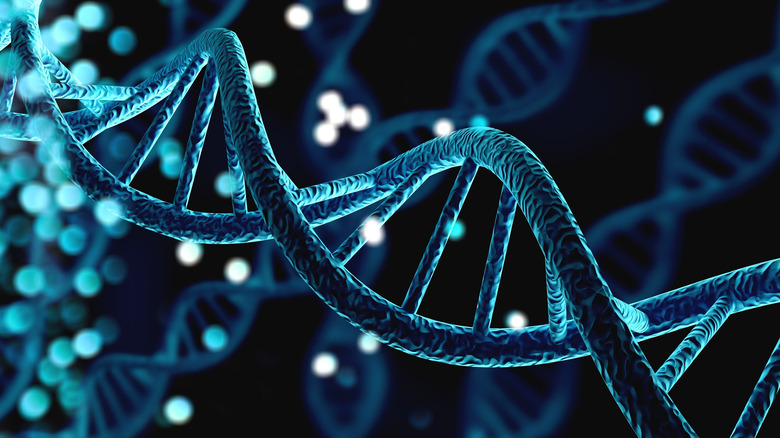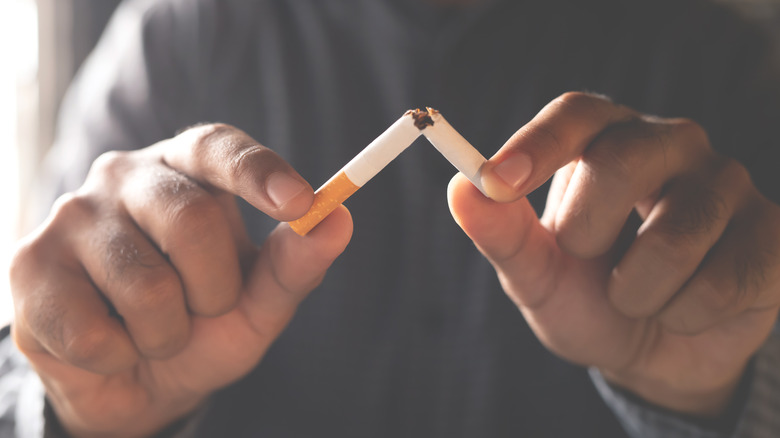What Are The Different Types Of Aging?
Each year on your birthday, you become a year older and celebrate the achievement of a new age. The process of aging is perhaps the most natural and universal experience that everyone across the globe goes through. Whether you age from 15 to 16 and excitedly celebrate being able to drive, or you age from 39 to 40 or 49 to 50 and your loved ones joke that you're over the hill, everyone ages. The World Health Organization (WHO) reports that in today's world, people are living longer than they have in previous times. By the year 2050, there are expected to be over 2 billion people over the age of 60 living on the planet, indicating that understanding the aging process is important for the quality of life on both the individual level and on an international platform when it comes to how societies embrace aging.
The stages of human development are often thought of as childhood, adolescence, adulthood, and old age (via Lumen). Children visibly grow larger in size until they reach adulthood, and puberty is a stage of likely memorable and perhaps awkward development as the body changes so drastically. But when it comes to the thought of aging, images that come to mind are likely of gray hair and wrinkles. In reality, the body begins aging from the moment you're born. As you grow older, regardless of your numerical age, the cells in your body progress and change in ways that conduct the aging process.
Cells constantly change
Even though cosmetic companies may push anti-aging products to fight wrinkles or other aspects of growing older, the cells and hormones in your body don't pay those beauty industry advertisements any mind. Cells and hormones have a job to do, so they keep calm and carry on. They change and progress unapologetically. According to Healthline, the body is affected by intrinsic factors, like cellular aging, and extrinsic factors that are attributed to your environment. Cells can be affected by intrinsic factors, like genetics, and extrinsic factors, such as exposure to pollution and toxins. Cellular aging occurs because of the primitive process of evolution over time with an emphasis on the cellular decline. As cells become damaged over the lifespan, visible changes like gray hair and wrinkles occur, but cellular aging also occurs within the body, where the effects of aging aren't easily perceptible.
Cells within the body are the essential building blocks that comprise every piece of living tissue, and each cell continuously changes as the body ages (via Mount Sinai). As time passes, cells grow in size and lose their ability to divide and multiply new cells to repair damage to tissue and organs. When cells lose their ability to rejuvenate the body, organs and internal connective tissue can become rigid and stiff, resulting in conditions like arthritis. Without new cells to repair the damage, tissue can lose mass, thus causing physical weakness. Cellular aging is natural and can't be stopped.
Wear and tear contributions
The wear and tear placed on your body as you go through life can contribute to the aging process by means of extrinsic pressure. According to Mount Sinai, prior and current illnesses can contribute to accelerated cellular aging, as can medications and exposure to harmful environmental elements. To put wear and tear into literal terms, placing physical demands on your body can cause cell damage, especially if the physical stress is extreme, requires habitual strain, or involves intense impact. Changing altitude and experiencing sudden increases in altitude, particularly to very high altitudes, can also push wear and tear aging. Stress on one organ or connective tissue can lead to strain throughout the body.
In addition to the natural path of function decline cells undergo as the body ages, extrinsic factors like pollution, ultraviolet (UV) rays, toxins, and lifestyle factors contribute to an acceleration of cellular damage, thus contributing to the aging process (via Healthline). Intrinsic cellular damage and extrinsic factors are unavoidable, but there are individual aspects of both aging types that affect each person uniquely. For instance, one person at age 50 may have more cellular damage due to genetics and lifestyle habits, like smoking tobacco, than a peer at age 50 who has less cellular damage due to their own individualized aging factors. There is no way to determine how rapidly your cells will age, but there are healthy lifestyle habits that you can cultivate to decrease extrinsic factors.
Lifestyle habits to adopt and avoid
While you can't change the natural path of your cells, you can create or eliminate habits that contribute to protecting your cellular health, and therefore your entire body, from extrinsic pressures that expedite aging. In this case, dietary choices are extremely important, per the American Academy of Dermatology Association. Limiting alcohol consumption, complete cessation of tobacco products, and significantly reducing foods containing refined carbohydrates and added sugars are recommendations for reducing or eliminating dietary factors known to increase aging. On the flip side, incorporating lots of fresh foods, particularly vegetables, can help maintain cellular health and, in turn, decrease aging from extrinsic factors. Choosing fruits and vegetables over foods with excessive sugar and refined ingredients can prevent premature skin aging. Combining a healthy diet with regular exercise, with an emphasis on moderate exercise several days a week, are evidence-backed ways to protect cellular health.
A 2022 study published in Cells found that ultraviolet (UV) light rays and pollution lead to tissue inflammation of the skin, thus promoting aging. When UV rays and air pollution are combined, the damage to skin cells is increased. While beauty advertisements for anti-wrinkle products aren't always worth the money, cosmetic products that protect skin from extrinsic aging factors include products with sun protection of at least SPF 30, per Scripps. However, products containing protective elements to ward off UVA and UVB rays should be used daily, rather than intermittently, to best protect skin from aging.
Age with a healthy mindset
Aging is completely natural, and accepting the aging process in the throes of society's obsessions with fighting it is one of the hardest-yet-healthiest things you can do. Instead of trying to combat aging, try to shift your focus to approach the process of aging with a mindset rooted in healthy behaviors and habits that will allow you to live the longest, happiest life you possibly can, reports The New York Times. Gaining perspective, continuing to exercise, maintaining a diet rooted in fresh vegetables and whole foods, and having a diverse social life are key ways to age with health and happiness. Making new friends and remaining social are significant ingredients in protecting mental health as aging occurs. Gayatri Devi, MD, a neurologist at Lenox Hill Hospital, told The New York Times about a patient who challenged himself to make a new friend each decade before he passed away at age 101. If you're up for the challenge, making new friends can make aging easier and more enjoyable.
Your approach and mindset to aging are intrinsically tied to your mental well-being, and prioritizing it is imperative. Obtaining treatment and healthy coping outlets for anxiety, depression, social fears, and stress can help maintain cognitive health as you age (via Ambience). Prioritizing sleep should be at the top of your list, given that sufficient sleep can allow cells to rejuvenate, per Sleep Foundation. A full night of sleep can reduce stress and boost mood and mindset.





